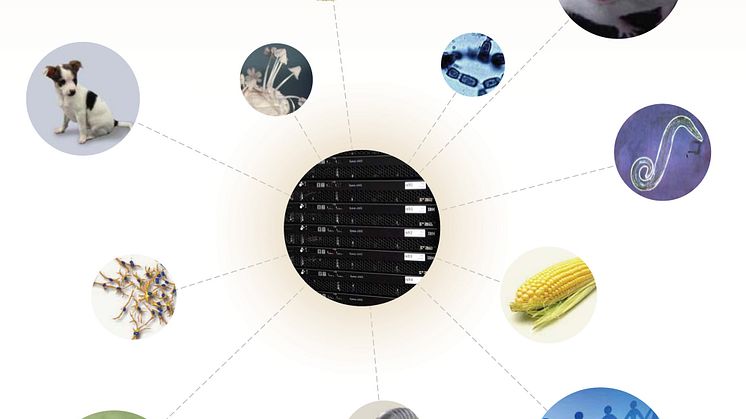Pressmeddelande -
Computer superpower strengthens attempts to combat common diseases
New large-scale sequencing technology will revolutionize biomedical research in the coming decade. Uppsala University's entity UPPMAX is now expanding its operations and providing researchers with a powerful system for large-scale compute and storage of data, which can lead to new breakthroughs in research on our public-health disorders.
Among other things, the new large-scale sequencing technology offers researchers the opportunity to understand the impact of the genome on the genesis of common diseases. Questions can be posed in a different way with more large-scale methods. For instance, the technology renders it possible to map all the bacteria in a person's mouth, to see why one individual develops malaria while another does not, and how the malaria parasite adapts in order to elude people's immune defences. It can also involve cataloguing all DNA modifications in a cancer cell. Furthermore, scientists have found regions in our genes that increase the risk of various common diseases such as cancer, diabetes, obesity, and autoimmune diseases. These regions were identified through the use of so-called SNP chips, but since then it has proven difficult to find the actual mutations that cause disease.
"The new sequencing methods supported by this funding offer tremendous potential for finding many of these mutations. Knowledge about the mutations and disease mechanisms will enable development of better, more targeted drugs," says Kerstin Lindblad-Toh, professor of comparative genomics.
Since extremely large quantities of data are produced in such studies, many terabytes of both data storage and primary memory in order to be able to deal with and analyze these data. Kerstin Lindblad-Toh, in collaboration with UPPMAX director Ingela Nyström, has led the research team at Uppsala University that was recently granted SEK 13 million from the Knut and Alice Wallenberg Foundation (KAW) to construct a computing system that meets the needs of the sequencing platform that already exists at Uppsala University. At present there are three new technology sequencing machines, which make Uppsala University the largest player in the Nordic countries in this field. This position will now be strengthened even further.
Large-scale computations and large-scale storage, processing, and analysis of data play an ever greater role in many scientific fields. The Swedish National Infrastructure for Computing (SNIC) announced, together with KAW, that funding was available for resources for framework of SNIC's general resources. KAW contributed investment capital and SNIC operational and user support. Two of eight applications submitted were granted.
"Uppsala University hit the jackpot, since both projects have Uppsala researchers involved. One is for research on new energy materials that Professor Olle Eriksson is conducting, with colleagues, and the other is this visionary genome-sequencing research," says Ingela Nyström.
The new computer system for DNA sequencing will be located at Uppsala Multidisciplinary Center for Advanced Computational Science (UPPMAX) and will be run by the Center's systems experts. Since its establishment in 2003, UPPMAX has provided researchers, both locally and nationally, with computational power from a number of computer clusters. A previous allocation from SNIC in 2008 is earmarked for a new cluster of some 2000 computing cores and is under procurement. This new grant will add yet another cluster.
"What's more, our activities are expanding to include extensive data storage, some 500 terabytes. Some data will have to be stored up to ten years, which places special demands on the technology," says Ingela Nyström.
SNIC has six member centers in Sweden (from north to south: HPC2N in Umeå, UPPMAX in Uppsala, PDC in Stockholm, NSC in Linköping, C3SE in Göteborg, and Lunarc in Lund). With the two latest grants to UPPMAX, Uppsala University will play a significant role in providing Sweden's researchers with adequate infrastructure.
A dozen leading researchers collaborated on the application in order to attain the common goal of satisfying the need to be able to deal with the enormous quantities of data from modern sequencing technology. The researchers, Kerstin Lindblad-Toh, Ulf Gyllensten, Ann-Christine Syvänen, Leif Andersson, Siv Andersson, Rolf Ohlsson, Claes Wadelius, Erik Bongcam-Rudloff, Helgi B. Schiöth, Hans Ronne, and Joakim Lundeberg, all work with different biological problem complexes and submitted a joint application in order to have the new technologies function as efficiently as possible.
Read more about the project oriented toward new energy materials. http://www.uu.se/press/pm.php?typ=pm&id=498
For more information, please contact Professor Kerstin Lindblad-Toh
kersli@broad.mit.edu, phone: +1 617 223 7476 (currently in the US),
UPPMAX director Ingela Nyström, ingela.nystrom@it.uu.se, cell phone:
+46 (0)70-167 9045, or UPPMAX chief systems expert Jukka Komminaho, Jukka.Komminaho@it.uu.se, phone: +46 (0)18-471 1024.
